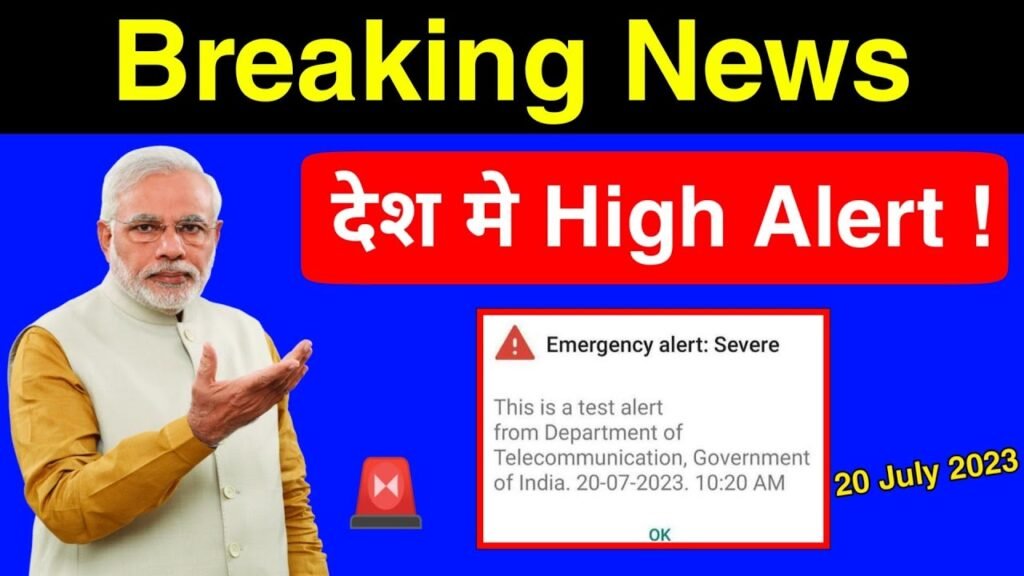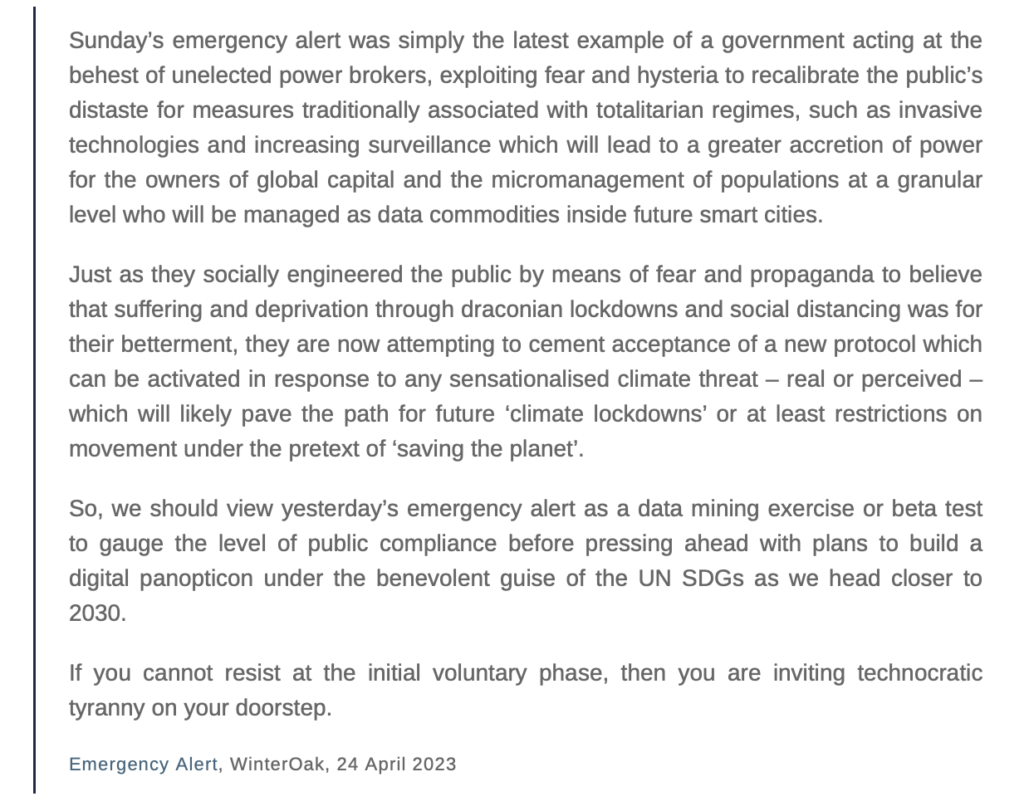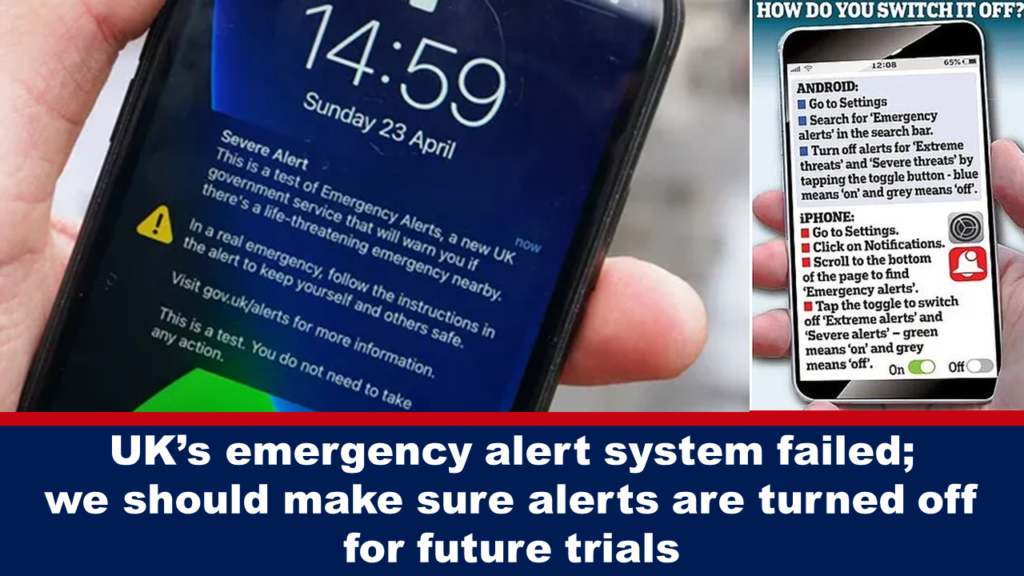Received ‘Emergency alert: Severe’ message on your phone? Here’s what it means
The notification was sent by the Department of Telecommunication as a test message to all mobile devices.

Multiple smartphones on Thursday received a message ‘Emergency Alert: Severe’ at around 1.30 pm.
“This is a SAMPLE TESTING MESSAGE sent through Cell Broadcasting System by Department of Telecommunication, Government of India. Please ignore this message as no action is required from your end. This message has been sent to TEST Pan-India Emergency Alert System being implemented by National Disaster Management Authority. It aims to enhance public safety and provide timely alerts during emergencies,” the flash message read.

The notification was actually a test message sent by the Department of Telecommunication to check its emergency alert system.
Click Here
“These tests will be performed from time to time in various regions across the country to gauge the efficiency and effectiveness of emergency alert broadcasting capabilities of the systems in place, of various Mobile Operators and Cell Broadcast System”, a statement by the Department of Telecommunications dated July 20 read.
According to DoT, the cell broadcast alert system is a technology which allows the government to send critical and time-sensitive messages for disaster management to all the mobile devices within a designated geographical area, irrespective of whether the recipients are residents or visitors.
The government said the alert system ensures that necessary emergency info reaches the maximum people in a timely manner. It is used by government agencies and emergency services to inform public about potential threats and keep them informed.
Cell Broadcast is commonly used to deliver emergency alerts, such as severe weather warnings like tsunami, flash floods, earthquakes etc.
UK’s emergency alert system failed; we should make sure alerts are turned off for future trials
The UK government’s emergency alert was intended to reach people’s phones at 3 pm on Sunday. However, some said they received it a minute earlier, others half an hour late, and many said they didn’t get sent it at all. The national emergency alert system failed to sound on up to 10 million phones. ( https://www.telegraph.co.uk/news/2023/04/23/emergency-alert-test-chaos-fails-10-million-phones/ )
It was probably better to not receive it at all when you consider that some people said they were sent the emergency alert during the early hours of Monday morning. Others also reported that they received the alert on Monday morning for the second time. (https://www.gbnews.com/news/emergency-alert-test-update-didnt-receive-alert-1am )
But those who didn’t receive the alert may consider themselves even more fortunate considering some people have reported on social media that they have not been able to make or receive calls since the alarm went off on their device at 3 pm on Sunday.( https://www.manchestereveningnews.co.uk/news/uk-news/emergency-alert-test-review-announced-26764564 )
The farce doesn’t end with failures to receive alerts. Welsh speakers were perturbed to receive a message that made no sense after the computerized system made up the word “Vogel,” which is a ski resort in Slovenia. The letter ‘V’ does not exist in the Welsh language.
Fujitsu – who was awarded a contract to help develop the UK’s emergency alert system – is no stranger to faulty systems. They are responsible for the Horizon accounting system used by the Post Office that caused the wrongful conviction and punishment of sub-postmasters leading to bankruptcies, deaths, incarceration and the misery of many.
Irrespective of whether the test failed or succeeded, whether the software is faulty or not, the key takeaway is: for those who did not turn off their alerts for this test, it is important to turn them off for any future trials. Why? Because, among others, owing to the false narratives of the covid era and the ensuing destructive policies imposed on the population, our government has forfeited the right to be trusted in the event of an emergency.
In the video below, David Thunder, who lives in Navarra, explained why he would not be participating in the emergency alert system in his home town. His explanation is as applicable in the UK, or anywhere in the world, as it is in Navarra.
A few days before the UK’s trial, the Government of Navarra, Spain ran an emergency alert drillfor all cell or mobile phones in the region. I will be turning my phone off, Thunder said. After the tyranny of the covid era, “the bottom line is I’m way more scared of my government than of any emergency that could befall us, any natural disaster that could befall us.”
David Thunder: Emergency Alert Drill? I Think I’ll Pass… 22 April 2023 (3 mins)
What kind of emergencies is the UK government thinking may require an emergency alert? Last month, Chancellor of the Duchy of Lancaster Oliver Dowden said: “We are strengthening our national resilience with a new emergency alerts system, to deal with a wide range of threats – from flooding to wildfires. It will revolutionise our ability to warn and inform people who are in immediate danger, and help us keep people safe.” So, is it simply a tool to reinforce the “climate change” fear?
Canadian Douglas Farrow pointed out the Government’s announcement which ends with ‘What you need to do’. “When you get an alert, stop what you’re doing and follow the instructions in the alert,” the Government website states.
“That last bit is the crucial bit,” Farrow noted, “it’s the behaviour modification payload. We had an earful of this in Montreal during the pandemic lockdowns that all are trying their best to forget. Random interventions blared through our radios, televisions, and cell phones, warning us of danger everywhere and of the necessity of obeying government edicts in order to ‘stay safe’. All lies, of course. It was the edicts that threatened us. It was the authorities themselves … assaulting us.”
Farrow added: “But our conditioning had begun. We would learn to trust the government and media aligned with the government: to call ‘danger’ what they call danger, to call ‘fact’ what they call fact; to call ‘conspiracy’ what they call conspiracy. And whenever the horn should sound, we would stop doing whatever we might happen to be doing of our own free will and start doing instead exactly what we were told to do.”
“It’s important to note that these emergency alerts are part of a coordinated global strategy among governments which are marching lockstep with the World Economic Forum’s Great Reset, according to which nations must commit towards the implementation of several UN Sustainable Development Goals (“SDGs”) by 2030,” WinterOak wrote.
( https://winteroak.org.uk/2023/04/24/emergency-alert/ )


With zero consultation, the UK government has taken control of people’s private property and installed their Emergency Alert App on to our smartphones. They plan to test their App on our phones on 23rd April. What are they up to, and what can we do to disrupt their ‘Emergency Alert’ psychological operation?
Source: Hindustantimes, Expose-news, Wikipedia, Youtube
